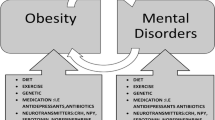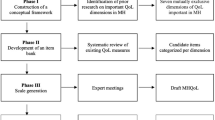Abstract
Aims
Quality of life is a major focus of health care today. In published studies on patients with type 2 diabetes, findings on quality of life are mixed. Those with diabetes have chronic illness and must adhere to a complicated care regimen daily, which for many patients is challenging. This study analyzed psychosocial factors and metabolic control as potential predictors of quality of life among these patients.
Methods
A cross-sectional study of 397 patients with type 2 diabetes was conducted in a hospital in Nanjing, China. Demographic information and clinical characteristics were collected from the medical record. The World Health Organization Quality of Life-BREF, General Self-Efficacy Scale, Diabetes Distress Scale, and Diabetes Empowerment Scale-Short Form were administered.
Results
The mean score of quality of life was 67.80 ± 13.44 on a 100-point scale. General self-efficacy (β = 0.340, P < 0.001), diabetes distress (β = −0.266, P < 0.001), and diabetes empowerment ability (β = 0.207, P < 0.001) were predictors of quality of life. In contrast, other factors including HbA1c, diabetes complications, and the duration of diabetes were not associated with quality of life (P > 0.05).
Conclusions
Our study indicated that psychosocial factors such as self-efficacy, diabetes distress, and diabetes empowerment ability are related to quality of life. Assessment and interventions aimed at reducing psychosocial problems should be applied in diabetes care.
Similar content being viewed by others
References
Shaw JE, Sicree RA, Zimmet PZ (2010) Global estimates of the prevalence of diabetes for 2010 and 2030. Diabetes Res Clin Pract 87(1):4–14. doi:10.1016/j.diabres.2009.10.007
Yang WY, Lu JM, Weng JP et al (2010) Prevalence of diabetes among men and women in China. N Engl J Med 362(12):1090–1101
Xu Y, Wang L, He J et al (2013) Prevalence and control of diabetes in Chinese adults. JAMA 310(9):948–959. doi:10.1001/jama.2013.168118
Guariguata L, Whiting DR, Hambleton I, Beagley J, Linnenkamp U, Shaw JE (2014) Global estimates of diabetes prevalence for 2013 and projections for 2035. Diabetes Res Clin Pract 103(2):137–149. doi:10.1016/j.diabres.2013.11.002
Papadopoulos AA, Kontodimopoulos N, Frydas A, Ikonomakis E, Niakas D (2007) Predictors of health-related quality of life in type II diabetic patients in Greece. BMC Public Health 7:186. doi:10.1186/1471-2458-7-186
World Health Group (1995) The World Health Organization Quality of Life assessment (WHOQOL): position paper from the World Health Organization. Soc Sci Med 41(10):1403–1409
Fal AM, Jankowska B, Uchmanowicz I, Sen M, Panaszek B, Polanski J (2011) Type 2 diabetes quality of life patients treated with insulin and oral hypoglycemic medication. Acta Diabetol 48(3):237–242. doi:10.1007/s00592-010-0244-y
Celano CM, Beale EE, Moore SV, Wexler DJ, Huffman JC (2013) Positive psychological characteristics in diabetes: a review. Curr Diabetes Rep 13(6):917–929. doi:10.1007/s11892-013-0430-8
Jiang JW, Zhou YJ, Hu HF, Zhou MF (2011) Research on relationship between self-efficacy and quality of life in patients with diabetic complications. Shanghai Nurs 11:12–14
Tol A, Sharifirad G, Eslami A, Shojaeizadeh D, Alhani F, Tehrani MM (2015) Analysis of some predictive factors of quality of life among type 2 diabetic patients. J Educ Health Promot 4:9. doi:10.4103/2277-9531.151903
Nicolucci A, Kovacs Burns K, Holt RIG et al (2013) Diabetes attitudes, wishes and needs second study (DAWN2™): cross-national benchmarking of diabetes-related psychosocial outcomes for people with diabetes. Diabet Med 30(7):767–777. doi:10.1111/dme.12245
Funnell MM, Anderson RM, Arnold MS et al (1991) Empowerment: an idea whose time has come in diabetes education. Diabetes Educ 17(1):37–41. doi:10.1177/014572179101700108
Anderson RM, Funnell MM (2000) Compliance and adherence are dysfunctional concepts in diabetes care. Diabetes Educ 26(4):597–604
Chen MF, Tsai CT, Hsu SM, Tu SY, Kao PL, Chen SL (2013) Patient perceptions of empowerment processes, health outcomes and related factors in patients living with diabetes in Taiwan: a cross-sectional survey. J Community Health Nurs 30(4):201–215. doi:10.1080/07370016.2013.838488
Bandura A (1977) Self-efficacy: toward a unifying theory of behavioral change. Psychol Rev 84(2):191–215
Matziou V, Tsoumakas K, Vlahioti E et al (2011) Factors influencing the quality of life of young patients with diabetes. J Diabetes 3(1):82–90. doi:10.1111/j.1753-0407.2010.00106.x
Penckofer S, Quinn L, Byrn M, Ferrans C, Miller M, Strange P (2012) Does glycemic variability impact mood and quality of life? Diabetes Technol Ther 14(4):303–310. doi:10.1089/dia.2011.0191
Mngomezulu N, Yang CC (2015) Quality of life and its correlates in diabetic outpatients in Swaziland. Int Health. doi:10.1093/inthealth/ihv019
Papelbaum M, Lemos HM, Duchesne M, Kupfer R, Moreira RO, Coutinho WF (2010) The association between quality of life, depressive symptoms and glycemic control in a group of type 2 diabetes patients. Diabetes Res Clin Pract 89(3):227–230. doi:10.1016/j.diabres.2010.05.024
Rubin RR, Peyrot M (1999) Quality of life and diabetes. Diabetes Metab Res Rev 15:205–218
Mashitani T, Hayashino Y, Okamura S et al (2015) Diabetes treatment-related quality of life is associated with levels of self-care activities in insulin injection among Japanese patients with type 2 diabetes: Diabetes Distress and Care Registry at Tenri (DDCRT 8). Acta Diabetol 52(4):639–647. doi:10.1007/s00592-015-0725-0
Lu QC, Qiu CZ, Gao LM, Zeng CP (2014) Affect on the quality of life by empowerment for patients with type 2 diabetes mellitus. J Nurs Train 29:783–786
World Health Organization (1999) Definition, diagnosis and classifications of diabetes mellitus and its complications. Report of a WHO consultation: part 1: diagnosis and classifications of diabetes mellitus. World Health Organization, Geneva
Ma GS, Kong LZ, Luan DC et al (2005) The descriptive analysis of the smoking pattern of people in China. Chin J Prev Control Chronic Non-commun Dis 13(5):195–199
Zhang X, Luo J, Wang SH et al (2010) The effect of long-term alcohol intake on circadian rhythm of ambulatory blood pressure in males with hypertension. Chin J Hypertens 18(9):880–884
Hao YT, Fang JQ (2000) The introduce and usage of WHOQOL instrument in Chinese. Mod Rehabil 4(8):1127–1145
Schwarzer R, Born A (1997) Optimistic self-beliefs: assessment of general perceived self-efficacy in thirteen cultures. World Psychol 3:177–190
Zhang JX, Schwarzer R (1995) Measuring optimistic self-beliefs: a Chinese adaptation of the General Self-efficacy Scale. Psychologia 38:174–181
Yang Q, Liu XQ (2010) Reliability and validity of the diabetes distress scale. J Nurs (China) 17:8–10
Fisher L, Hessler DM, Polonsky WH, Mullan J (2012) When is diabetes distress clinically meaningful?: establishing cut points for the diabetes distress scale. Diabetes Care 35(2):259–264. doi:10.2337/dc11-1572
Anderson RM, Funnell MM, Fitzgerald JT, Marrero DG (2000) The diabetes empowerment scale: a measure of psychosocial self-efficacy. Diabetes Care 23(6):739–743
Anderson RM, Fitzgerald JT, Gruppen LD, Funnell MM, Oh MS (2003) The diabetes empowerment scale-short form (DES-SF). Diabetes Care 26(5):1641–1642
Hu BB, Lou QQ, Tian Y, Zhang QW, Zhu JY (2011) Study on empowerment and its influencing factors among diabetes inpatients. Chin J Nurs 46(3):225–228
Guo AM, Weng XQ, Wu AN, Qi F (2002) Analysis on quality of life of elderly in urban area. Chin J Public Health 18:849–851
Kolawole BA, Mosaku SK, Ikem RT (2009) A comparison of two measures of quality of life of Nigerian clinic patients with type 2 diabetes mellitus. Afr Health Sci 9(3):161–166
Shrivastava U, Misra A, Gupta R, Viswanathan V (2015) Socioeconomic factors relating to diabetes and its management in India. J Diabetes. doi:10.1111/1753-0407.12316
Zhang WH, Hu SJ, Liu YX, Jing J, Gu M (2009) Investigation of quality of life and mental state and social support received in patients with type 2 diabetes in shenzhen communities. Chin Gen Pract 12(1B):166–168
Hart HE, Redekop WK, Berg M, Bilo HJG, Meyboom-de Jong B (2005) Factors that predicted change in health-related quality of life were identified in a cohort of diabetes mellitus type 1 patients. J Clin Epidemiol 58(11):1158–1164. doi:10.1016/j.jclinepi.2005.02.021
Chew BH, Shariff-Ghazali S, Fernandez A (2014) Psychological aspects of diabetes care: effecting behavioral change in patients. World J Diabetes 5(6):796–808. doi:10.4239/wjd.v5.i6.796
Carper MM, Traeger L, Gonzalez JS, Wexler DJ, Psaros C, Safren SA (2014) The differential associations of depression and diabetes distress with quality of life domains in type 2 diabetes. J Behav Med 37(3):501–510. doi:10.1007/s10865-013-9505-x
Snoek FJ, Kersch NY, Eldrup E et al (2011) Monitoring of individual needs in diabetes (MIND): baseline data from the cross-national diabetes attitudes, wishes, and needs (DAWN) MIND study. Diabetes Care 34(3):601–603. doi:10.2337/dc10-1552
Tang TS, Funnell MM, Brown MB, Kurlander JE (2010) Self-management support in “real-world” settings: an empowerment-based intervention. Patient Educ Couns 79(2):178–184. doi:10.1016/j.pec.2009.09.029
Tol A, Alhani F, Shojaeazadeh D, Sharifirad G, Moazam N (2015) An empowering approach to promote the quality of life and self-management among type 2 diabetic patients. J Educ Health Promot 4:13
Anderson RM, Funnell MM (2010) Patient empowerment: myths and misconceptions. Patient Educ Couns 79(3):277–282. doi:10.1016/j.pec.2009.07.025
Anderson RM, Funnell MM, Aikens JE et al (2009) Evaluating the efficacy of an empowerment-based self-management consultant intervention: results of a two-year randomized controlled trial. Ther Patient Educ 1(1):3–11. doi:10.1051/tpe/2009002
Critchley CR, Hardie EA, Moore SM (2012) Examining the psychological pathways to behavior change in a group-based lifestyle program to prevent type 2 diabetes. Diabetes Care 35(4):699–705. doi:10.2337/dc11-1183
Raballo M, Trevisan M, Trinetta AF et al (2012) A study of patients’ perceptions of diabetes care delivery and diabetes: propositional analysis in people with type 1 and 2 diabetes managed by group or usual care. Diabetes Care 35(2):242–247. doi:10.2337/dc11-1495
Fisher L, Hessler D, Glasgow RE et al (2013) REDEEM: a pragmatic trial to reduce diabetes distress. Diabetes Care 36(9):2551–2558. doi:10.2337/dc12-2493
Wikblad K, Leksell J, Wibell L (1996) Health-related quality of life in relation to metabolic control and late complications in patients with insulin dependent diabetes mellitus. Qual Life Res 5(1):123–130
Scollan-Koliopoulos M, Bleich D, Rapp KJ, Wong P, Hofmann CJ, Raghuwanshi M (2013) Health-related quality of life, disease severity, and anticipated trajectory of diabetes. Diabetes Educ 39(1):83–91. doi:10.1177/0145721712467697
Trento M, Charrier L, Salassa M et al (2015) Depression, anxiety and cognitive function in patients with type 2 diabetes: an 8-year prospective observational study. Acta Diabetol 52(6):1157–1166. doi:10.1007/s00592-015-0806-0
Author information
Authors and Affiliations
Corresponding author
Ethics declarations
Conflict of interest
All the authors declare that they have no conflict of interest.
Ethical standard
The study protocol was reviewed by the ethics committee of Jiangsu Province Hospital on Integration of Chinese and Western Medicine affiliated with Nanjing University of Chinese Medicine.
Human and animal rights
All procedures followed were in accordance with the ethical standards of the responsible committee on human experimentation (institutional and national) and with the Helsinki Declaration of 1975, as revised in 2008.
Informed consent
Informed consent was obtained from all patients before they were included in the study.
Additional information
Managed by Massimo Porta.
Rights and permissions
About this article
Cite this article
Zhu, Y., Fish, A.F., Li, F. et al. Psychosocial factors not metabolic control impact the quality of life among patients with type 2 diabetes in China. Acta Diabetol 53, 535–541 (2016). https://doi.org/10.1007/s00592-015-0832-y
Received:
Accepted:
Published:
Issue Date:
DOI: https://doi.org/10.1007/s00592-015-0832-y




